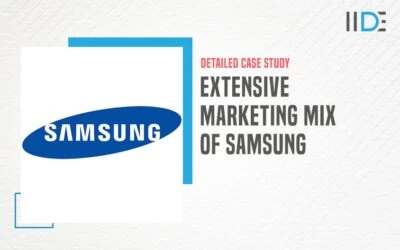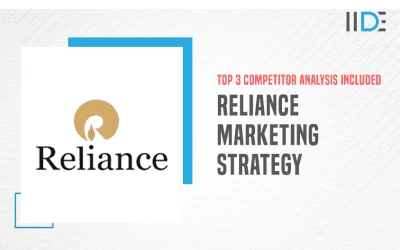In our earlier blog, we did an elaborative study on the SWOT analysis of the largest construction company in the world, CSCEC. This time we will go through the SWOT analysis of Vanke, China’s major real estate company in extensive detail.
Since it entered the housing market in 1988, Vanke has grown into a leading real estate corporation in China, with its primary activity being real estate development and property management. By the end of 2015, Vanke had covered 66 cities in mainland China, which includes the cities of Guangzhou and Shenzhen, Shanghai, Beijing, and the major cities in Midwest China. Vanke has been involved in dozens of real estate development projects internationally also.
Vanke’s marketing efforts are another factor that has helped the company grow into the behemoth it is today. If you are inquisitive to learn more about the marketing world – check out our Free MasterClass on Digital Marketing 101 by the CEO and Founder of IIDE, Karan Shah.
Let’s take a look at the reason behind the success of Vanke. In this blog, we will cover the strengths, weaknesses, opportunities and threats surrounding Vanke. Before we start, let us begin by learning about the company, its history, products, services and financial success.
About Vanke

Vanke, founded by Wang Shi in 1984 is a major Chinese residential real estate developer. It is involved in property development, management, and sales in over 60 mainland Chinese cities in the Pearl River Delta, Yangtze River Delta, and Bohai-Rim Region, as well as investment, trading, consulting, and e-business.
Vanke became the second firm to be listed on the Shenzhen Stock Exchange after Shenzhen Development Bank in 1991. Vanke ranked 208th in the Fortune Global 500 in 2020. In 2020, Vanke was ranked 96th in the Forbes Global 2000.
The group has been persistently providing good products and good services to the general public, satisfying people’s various demands for a good life with its best efforts. The Group’s businesses have been expanded to areas such as commercial development, rental housing, logistics and warehousing services, ski resorts, and education. Building quality housing for ordinary people to live in is Vanke’s motto.
| Founder | Yu Liang |
|---|---|
| Year Founded | 1984 |
| Origin | China |
| No. of Employees | 131,500+ |
| Company Type | Public |
| Market Cap | $35.53 Billion (2022) |
| Annual Revenue | 419 billion Yuan (2021) |
| Net Income/ Profit | 22.5 billion yuan (2021) |

Products & Services by Vanke
Vanke has been in the real estate industry for many years and offers:
- Real Estate development – Development and sales of residential properties and Retail and office properties
- Property services – Residential property services, Commercial property office services, Developer services, Building based services, etc.
Competitors of Vanke
The top 5 competitors of Vanke are
- Edward Rose & Sons
- Xinyuan Real Estate
- CSM Corporation
- Sansiri
- Etalon Group
As now we have a better understanding of Vanke, let’s look into the SWOT Analysis of Vanke.
SWOT Analysis of Vanke
A SWOT analysis identifies a company’s strengths, weaknesses, opportunities, and threats. A proven and true management paradigm that allows Vanke to compare its business and performance with competitors and the industry as a whole.

So let us go ahead and first have a glance at the strengths of Vanke from the SWOT analysis of Vanke.
Strengths of Vanke
Your organisation’s strength is something that makes it stand out from the rest. It can be a competitive advantage that sets it apart from its competitors. Some of the strengths of Vanke are as follows –
- Leading Market Position: Vanke holds a leading market position in 21 cities in China owing to the high quality and diversified real estate products or services. Since its inception, the growth enabled the company to create new revenue streams and diversify its economic cycle.
- Good Capital Expenditure Returns: Vanke has an amazing track record of completing new projects within the deadline and generating good returns on capital expenditure by establishing new revenue sources.
- Overseas Market: Vanke always looks out for investment opportunities in overseas markets. It has already entered eight cities overseas, namely New York, San Francisco, Los Angeles, Seattle, London, Moscow, Singapore, Kuala Lumpur etc.
- Customer Satisfaction is Just High: Vanke has been able to achieve high customer satisfaction among current customers by providing quality housing solutions for ordinary people to live in. The company has also built strong brand equity among potential customers due to its dedicated customer relationship management department.
- Highly Qualified Workforce: The company provides thorough training, skill development, and learning opportunities to all its employees. Human resources are a major factor in the success of Vanke in the construction sector.
- Track Record of Projects: Vanke China has a successful record of completing enormous projects including 3672 contracted projects, from which 2663 are residential properties and 1009 are commercial properties in China. They always deliver innovative real-estate infrastructure.
- Catering to Different Customer Segments: Vanke China has an extensive set of products accommodating different segments of customers in the construction service department. This has helped the company to diversify its revenue streams.
Weaknesses of Vanke
Strategy is all about choices and weaknesses are areas where companies can improve through SWOT analysis and leverage their competitive advantage and strategic positioning.
- Lack of Digital Presence: In today’s day and age brands need to establish their presence on social media and the web. This way consumers can remain up to date with the upcoming projects.
- Gross Margins: The gross and operating margins, if not improved, could put pressure on the financial statement of the company.
- Declining Market Share: The construction service industry is growing at a fast pace, hence Vanke China needs to keep up with the market trends to drive future growth.
- High Cost of Replacing Existing Experts: Very few experienced employees are responsible for the growth of Vanke China. Replacing them and finding the right fit for the company is a tedious task.
- The Added Cost of New Supply Chain Network & Logistics: Technology and artificial intelligence have drastically altered old business models in the Capital Goods industry. This has led to a decrease in the dealer network of Vanke China. Building a robust supply chain network can be very expensive for the company.
Opportunities for Vanke
Opportunities are potential areas for companies to focus on to improve results, increase sales, and ultimately profit.
- Increasing Government Regulations: Regulations make it difficult for the unorganized players to operate in the property development segment. This can be a huge advantage for Vanke China to increase its customer base.
- Low Inflation Rates: Low inflation rate means more stability in the market. This enables Vanke China customers to get credit at a lower interest rate leading to an increase in the consumption of Vanke China products.
- Hiring Digital Marketers: The pandemic moved all businesses online. Having an online presence can boost the company’s relationship with its customers. Want to know how Vanke can boost its growth with social media? Then you must check out the benefits of social media marketing to answer your query.
- Technological Advancements: Advancements in technology are improving industrial productivity. If utilized wisely then tech can enable the company to maintain existing clients and lure in potential clients by providing them high-class services. Using technology can increase productivity and decrease extra costs.
- Customers Migrating to Higher End Products: Vanke China has strong brand recognition for their premium property development services segment. In the lower segment, customers have experience with excellent customer service. This represents a great opportunity for the company to increase its profitability in the market.
Threats to Vanke
Threats are environmental factors that can harm a company’s development. Here are some of Vanke’s threats:
- Upcoming Competition: Vanke China is a leader in product innovation in property development services, but it is still facing challenges and stiff competition from local as well as international competitors.
- Distrust in Government Institutions: There is always a threat of losing the IPR to the local competitors as the Intellectual Property Rights framework is not very strong in emerging markets, especially in China.
- Changing Demographics: The new generation is tech-savvy and is less brand loyal and more open to experimentation. This can lead to a reduction in margins in the long run.
- Commoditization of Products: There has been an increase in the commodification of the capital goods industry which is a major challenge for Vanke China and other players in the industry.
- Changing Political Environment: With Brexit impacting the European Union, the US-China trade war and the overall instability in the East can give a major blow to Vanke China, both in the rural and international markets.
This ends our elaborative SWOT analysis of Vanke. Let us conclude our learning below.
To Conclude
Vanke is a well-known real estate company with significant global positions. During the SWOT analysis of Vanke, we found that the company is highly dependent and enjoys strong brand awareness and trust from its customers. It has a solid logistic base and covers all markets it serves, but suffers from more active research and development from an increasing number of manufacturers and competitors in the same space.
But being such a huge brand across multiple countries, Vanke should continue to innovate and develop more products and launch them in the market with the best possible marketing strategies.
Especially digital marketing which is vital in today’s growing and expanding world, to get better results and to remain competitive in the market. If you don’t have any idea of what digital marketing is or want to learn more about it and upgrade yourself, here is Online Digital Marketing Course to know more.
We hope this blog on the SWOT analysis of Vanke has given you a good insight into the company’s strengths, weaknesses, opportunities and threats.
If you enjoy in-depth company research just like the SWOT analysis of Vanke, check out our IIDE Knowledge portal for more fascinating case studies.
Thank you for taking the time to read this, and do share your thoughts on this case study of the SWOT analysis of Vanke in the comments section below.







0 Comments